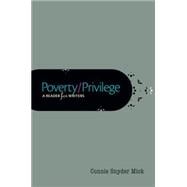Read. Write. Oxford.
In order to understand why people are poor, we must also look at why people are wealthy. Poverty/Privilege: A Reader for Writers examines the social, cultural, and political forces that offer-or deny-opportunities to people based on race, gender, age, and geography. By helping students understand how poverty works, this survey makes them aware of the problem and encourages them to become part of the solution.
Developed for the first-year composition course, Poverty/Privilege: A Reader for Writers includes an interdisciplinary mix of public, academic, and cultural reading selections, providing students with the rhetorical knowledge and compositional skills required to participate effectively in discussions about poverty and privilege.
Poverty/Privilege: A Reader for Writers is part of a series of brief single-topic readers from Oxford University Press designed for today's college writing courses. Each reader in this series approaches a topic of contemporary conversation from multiple perspectives.








